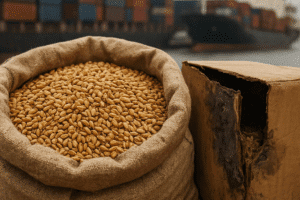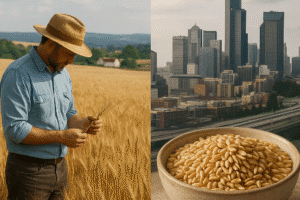The role of cooperatives in organic grain production is pivotal in shaping sustainable agricultural practices and enhancing food security. As the demand for organic products continues to rise, cooperatives have emerged as essential players in the organic grain market, providing farmers with the necessary resources, knowledge, and support to transition to organic farming. This article explores the significance of cooperatives in organic grain production, their benefits, challenges, and the future of this collaborative approach in agriculture.
Understanding Cooperatives in Organic Grain Production
Cooperatives are organizations owned and operated by a group of individuals for their mutual benefit. In the context of organic grain production, these cooperatives play a crucial role in facilitating the transition from conventional to organic farming methods. They provide a platform for farmers to share resources, knowledge, and experiences, which is particularly important in the organic sector where practices can vary significantly from traditional methods.
One of the primary functions of cooperatives in organic grain production is to offer education and training to farmers. This includes workshops on organic farming techniques, pest management, soil health, and certification processes. By equipping farmers with the necessary skills and knowledge, cooperatives help them to successfully navigate the complexities of organic farming.
Additionally, cooperatives often provide access to organic seeds and inputs, which can be a significant barrier for individual farmers looking to transition to organic practices. By pooling resources, cooperatives can negotiate better prices for organic inputs, making them more accessible to their members. This collective purchasing power not only reduces costs but also ensures that farmers have access to high-quality organic materials.
Benefits of Cooperatives in Organic Grain Production
The benefits of cooperatives in organic grain production extend beyond just resource sharing. They foster a sense of community among farmers, which can lead to increased collaboration and innovation. Here are some key advantages:
- Shared Knowledge and Experience: Cooperatives create a network of farmers who can share their experiences and best practices. This collective knowledge can lead to improved farming techniques and better crop yields.
- Market Access: Cooperatives often have established relationships with buyers, including retailers and processors, which can help farmers access markets that may be difficult to penetrate individually. This is particularly important in the organic sector, where consumers are increasingly seeking locally sourced products.
- Financial Support: Many cooperatives offer financial assistance to their members, including loans and grants for transitioning to organic farming. This financial support can alleviate some of the economic pressures associated with the initial investment required for organic certification.
- Advocacy and Representation: Cooperatives can serve as a collective voice for farmers, advocating for policies that support organic agriculture and addressing challenges faced by the sector. This representation is crucial in influencing regulations and standards that impact organic grain production.
Challenges Faced by Cooperatives in Organic Grain Production
Despite the numerous benefits, cooperatives in organic grain production also face several challenges. Understanding these obstacles is essential for developing strategies to overcome them and enhance the effectiveness of cooperatives.
1. Certification Complexities
One of the most significant challenges for cooperatives is navigating the organic certification process. The requirements for certification can be complex and time-consuming, often deterring farmers from pursuing organic practices. Cooperatives must invest time and resources in helping their members understand and comply with these regulations, which can be a daunting task.
2. Market Fluctuations
The organic grain market can be volatile, with prices fluctuating based on supply and demand. Cooperatives must be adept at market analysis and forecasting to ensure that their members receive fair prices for their products. This requires a deep understanding of market trends and consumer preferences, which can be challenging to maintain.
3. Resource Limitations
Many cooperatives operate on limited budgets, which can restrict their ability to provide comprehensive support to their members. This includes limitations in funding for educational programs, marketing initiatives, and infrastructure development. Cooperatives must find innovative ways to maximize their resources while still meeting the needs of their members.
4. Competition from Conventional Agriculture
Cooperatives in organic grain production often face competition from conventional agricultural practices, which can be more cost-effective due to economies of scale. This competition can make it difficult for organic farmers to compete on price, necessitating a focus on quality and sustainability to differentiate their products in the marketplace.
The Future of Cooperatives in Organic Grain Production
As the demand for organic products continues to grow, the role of cooperatives in organic grain production is likely to expand. The future of these organizations will depend on their ability to adapt to changing market conditions and the evolving needs of their members.
1. Embracing Technology
Technology is playing an increasingly important role in agriculture, and cooperatives must embrace these advancements to remain competitive. This includes utilizing data analytics for market forecasting, implementing precision agriculture techniques, and leveraging online platforms for marketing and sales. By adopting technology, cooperatives can enhance their efficiency and better serve their members.
2. Strengthening Community Engagement
Building strong relationships within the community will be essential for the success of cooperatives. Engaging with local consumers, schools, and organizations can help raise awareness about the benefits of organic grain production and foster a loyal customer base. Cooperatives can organize events, farm tours, and educational programs to connect with the community and promote their products.
3. Expanding Educational Initiatives
Continued education and training will be vital for the growth of organic grain production. Cooperatives should focus on providing ongoing support to their members, including advanced training on sustainable practices, marketing strategies, and financial management. By investing in education, cooperatives can empower farmers to thrive in the organic market.
4. Collaborating with Other Organizations
Collaboration with other agricultural organizations, research institutions, and government agencies can enhance the effectiveness of cooperatives. By forming partnerships, cooperatives can access additional resources, expertise, and funding opportunities. This collaborative approach can lead to innovative solutions for the challenges faced by organic grain producers.
Conclusion
The role of cooperatives in organic grain production is crucial for promoting sustainable agricultural practices and supporting farmers in their transition to organic methods. While challenges exist, the benefits of cooperation, shared knowledge, and collective action far outweigh the obstacles. As the organic market continues to grow, cooperatives will play an increasingly important role in shaping the future of organic grain production, ensuring that farmers can thrive while contributing to a more sustainable food system.













